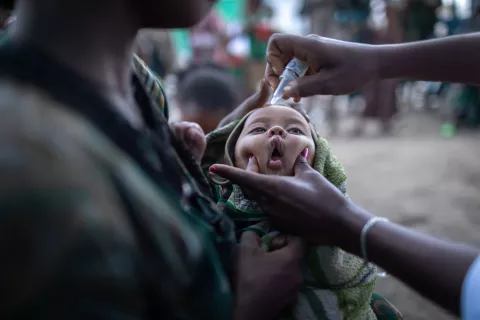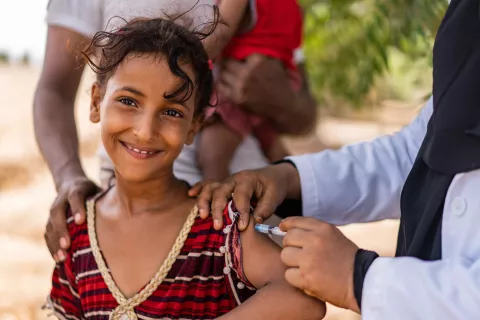World Hepatitis Day
- Available in:
- 中文
- English
Shanghai, July 28, 2014 – A young University graduate, while applying for a job, discovers he is a carrier of hepatitis B. His prospects for a job and marriage to his girlfriend all are under threat. With the help of a health officer, the discrimination he faces, is challenged and he ends up finding “sunshine after the rain”, the title of a theatre produced by arts students in Shanghai. Their final performance of the play, after 80 shows, was to mark this year's World Hepatitis day and encourage an end to the discrimination that surrounds the disease.
According to WHO, in China there are approximately 93 million carriers of hepatitis B and 8 million carriers of hepatitis C virus, with 20 million people in need of treatment of hepatitis B and 2.5 million in need of treatment of hepatitis C. This global health day, designated by the World Health Organizations four years ago, is intended to draw attention to the infectious disease, and improve efforts to screen, prevent, diagnosis and treat, the disease, that is a major cause of liver cancer and cirrhosis.
Celebrations for the 2014 World Hepatitis Day took place at a health center in Shanghai, China's largest city. Organized by the Shanghai Family Planning and Health Commission, signatories gathered in the main entrance of the busy center to commemorate the date and focus on efforts to prevent it.
With most of the infection for Hepatitis B happening at birth or at a young age, vaccination is a critical part of the national prevention efforts.
Since 2002, when the hepatitis B vaccine was introduced across the country, national coverage for newborns rose from just 22.2 percent in 1992 to 88.2 per cent in 2010, preventing 80 million new infections of the hepatitis B virus and more than 20 million chronic hepatitis B infections. This success was achieved through a well-coordinated effort of administering a timely birth dose of hepatitis B vaccine, followed by 2 more doses of hepatitis B vaccine during infancy.
China now has one of the highest birth dose rates in the world, with 96% of newborn infants getting vaccinated during their first day of life.
However, as WHO China's Dr. Lance Rodewald highlighted in his remarks at the event, China's successful hepatitis B vaccination program was threatened by widespread media reports of infant deaths following hepatitis B vaccination in December 2013. Confidence in the vaccine and the strategy of vaccinating at birth decreased, and some parents became hesitant to have their infants vaccinated.
Yet the Government investigation into the deaths, the vaccine, and the vaccine manufacturing was immediate and thorough. The investigation showed that the deaths were not caused by the vaccine – they would have happened even if the infants had not vaccinated - and that the vaccine and its manufacturing were of high quality. As a result of the response, parent confidence in hepatitis B vaccination has nearly recovered.
This message to reinforce vaccination efforts was echoed by UNICEF China's Chief of Communication who stressed that this is a communication challenge faced in many countries, where some of these preventable disease have largely disappeared from public consciousness. Yet we know to be successful in our vaccination efforts, we need to maintain high rates of coverage across the whole population and to explain to people why this matters” she said. “Reaching the finish line though will require continued commitment and diligence and public education, especially for new parents..
The Government echoed their commitment to strengthening the prevention of mother to child transmission through screening, evaluation of program effectiveness, and research can lead to further reduction of chronic hepatitis B among children.
In China, nearly a million babies are born each year to mothers with chronic hepatitis B. It is important to develop evidence-based methods to further prevent transmission during childbirth, and to assure through follow-up testing that prevention was successful.
Media contacts
About UNICEF
UNICEF works in some of the world's toughest places, to reach the world's most disadvantaged children. Across 190 countries and territories, we work for every child, everywhere, to build a better world for everyone. For more information about UNICEF and its work for children visit www.unicef.org.
| Visit UNICEF China website: www.unicef.cn Follow us on Sina Weibo: http://weibo.com/unicefchina Tencent Weibo: http://t.qq.com/unicef Wechat: unicefchina |



